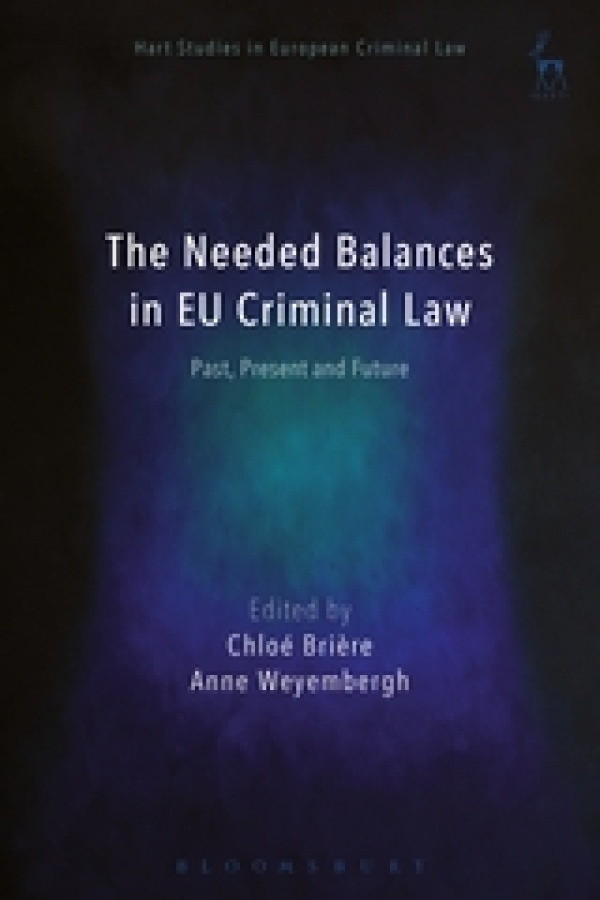The Needed Balances in EU Criminal Law - Past, Present and Future

About The Needed Balances in EU Criminal Law
This important volume provides an up-to-date overview of the main questions currently discussed in the field of EU criminal law. It makes a stimulating addition to literature in the field, while offering its own distinctive features. It takes a four-part approach: firstly, it addresses issues of a constitutional nature, such as the EU competence in the field of criminal law, the importance of the principle of subsidiarity and the role played by the different EU institutions. Secondly, it looks at issues linked to the quest of the right balance between diversity and unity, and focuses in particular on the special relationship between approximation and mutual recognition. Thirdly, it focuses on the balance between security and freedom, or, in other words, between the shield and sword functions of EU criminal law. Special attention is given here to transatlantic cooperation, data protection, terrorism, the European Arrest Warrant and the European Investigation Order. Finally, it examines the importance of balanced relations between criminal justice actors.
Table Of Contents
Part I: Introduction
1. Introduction by Vera Jourova, EU Commissioner for Justice, Consumers and Gender Equality
2. Introduction by Minister Koen Geens, Minister of Justice, Belgium
3. Introduction by Minister Félix Braz, Minister of Justice, Luxembourg
4. Introduction: About ECLAN and the Balances that Need to be Struck in EU Criminal Law by Chloé Brière and Anne Weyembergh
Part II: The Quest for the Right Balance in the Institutional Design/Between the EU and the Member States and Between the EU Institutions
5. The Evolution of Competence Distribution Between the European Union and the Member States in the Criminal Field
Samuli Miettinen
6. 'The Evolution of Competence Distribution Between the EU and the Member States in the Criminal Field' (by Samuli Miettinen)-A (Short) Reaction
Pedro Caeiro
7. The Principle of Subsidiarity in EU Criminal Law
Irene Wieczorek
8. Challenges Facing the Academic Community: A Practitioner's Point of View in Reaction to Irene Wieczorek's Paper
Eugenio Selvaggi
9. Stepping into Uncharted Waters No More: The Court of Justice and EU Criminal Law
Adam Lazowski
10. The Evolution of the Relationship and Balance Between the Different EU Institutions
Emilio de Capitani
Part III: The Quest for the Right Balance Between Diversity and Unity
11. The Issue of Mutual Trust and the Needed Balance Between Diversity and Unity
Daniel Flore
12. The Sensitive Relationship Between the Different Means of Legal Integration: Mutual Recognition and Approximation
Annika Suominen
13. Mutual Recognition in EU Criminal Law and Fundamental Rights-The Necessity for a Sensitive Approach
Anže Erbežnik
Part IV: The Quest for the Right Balance Between Liberty and Security
14. The External Dimension of Mutual Trust: The Coming of Age of Transatlantic Counter-terrorism Cooperation
Valsamis Mitsilegas
15. The Role of the Data Protection Authorities in Supervising Police and Criminal Justice Authorities Processing Personal Data
Paul de Hert and Juraj Sajfert
16. 'Foreign Terrorist Fighters'-De-Radicalisation and Inclusion vs Law Enforcement and Corrections in Denmark
Jørn Vestergaard
17. A New Hope? The Court of Justice Restores the Balance Between Fundamental Rights Protection and Enforcement Demands in the European Arrest Warrant System
Leandro Mancano
18. Mutual Recognition and Cross-Border Interception of Communications: The Way Ahead for the European Investigation Order
Lorena Bachmaier
Part V: The Quest for Balance Regarding Criminal Justice Actors and in Their Mutual Relations
19. A Comparison of the Evolution and Pace of Police and Judicial Cooperation in Criminal Matters: A Race Between Europol and Eurojust?
Sabine Gless and Thomas Wahl
20 The Cooperation Between Police and Justice at the EU Level: The Representative Example of Joint Investigation Teams
Anne Weyembergh, Inés Armada and Chloé Brière
21. The Draft Regulation on the Establishment of the European Public Prosecutor's Office-Issues of Balance Between the Prosecution and the Defence
Hans-Holger Herrnfeld
22. The Material Scope of Competence of the European Public Prosecutor's Office: Lex uncerta and unpraevia?
John A.E. Vervaele
Part VI: Conclusion
23. Afterword(s) on Mutual Recognition and the Respect for Fundamental Rights Revisited-Following the Judgment in Aranyosi and Caldararu
Judge Lars Bay Larsen
![]()
This project receives funding from the European Union's Horizon 2020 research and innovation programme under the Marie Sklodowska-Curie Grant Agreement No 722826.
















